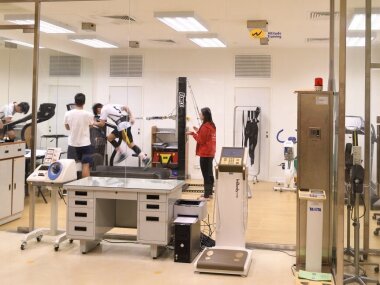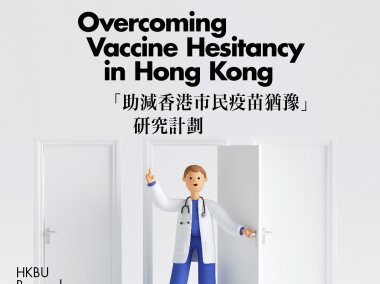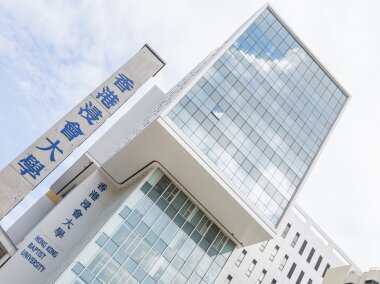Combating COVID-19 in Hong Kong
Hong Kong began to experience rapid surges of Omicron cases since January 2022 when the Covid-19 variant walloped much of Asia. The pandemic has shaped Hong Kong people’s lives, leaving many of them with feelings of grief, stress, anxiety, and even powerlessness at times.

To cope with the fifth surge of COVID-19, Hong Kong is enhancing its prevention measures, such as tightening social-distancing rules, launching vaccine passes in public venues, and the upcoming compulsory universal testing. In these difficult times, three teams of interdisciplinary scholars from Communication, Computer Science, Public Health, and Chinese Medicine at Hong Kong Baptist University (HKBU) call for new initiatives and strategies to cope with the surge by identifying and addressing possible blind spots in the city’s coping strategies. Specially, we focus on building up community resilience, enhancing social trust and empathy, and reducing anxiety and panic. Moreover, we are launching a rehabilitation programme to evaluate how exercising and Chinese herbal medicine are of help to COVID-19 patients’ virus-induced chronic conditions as well as their quality of life and mental health well-being. These research-based approaches could contribute to maintaining Hong Kong as a heart-warming community, empowering residents to find strength in community resilience and stay healthy. The Hong Kong experiences should reinstitute the image of the city as a model of success in containing the global pandemic.
Team One: Hong Kong Rehabilitation Programme for COVID-19 Patients
Team members: Prof. Julien Baker, Dr. Gemma Yang Gao, Prof. Yike Guo, Prof. Zhaoxiang Bian, Dr. Lidan Zhong, Ms. Jenny Chun Chau Li, Dr. Bess Wang, and Dr. Xiaoyi Fu
People with COVID-19 may experience physical, cognitive, and psychological problems. Many cases are living with chronic symptoms even after recovery, such as impaired physical functions, brain fog, and depression. The Hong Kong Rehabilitation Programme for COVID-19 develops a new paradigm for patient rehabilitation needed now and in the future. A 12-week programme with tele-exercise and Chinese herbal medicine, both individually as well as combined, will be provided to around 200 registered recovering COVID-19 patients. As per our knowledge, this programme would be the first of its kind of experimental intervention using a combination of exercise and Chinese medicine and exploring the role of the gut microbiome to study the rehabilitation of COVID-19 patients. It will help us understand how effective interventions could be implemented to enhance the quality of life and mental health of the recovering patients. It will also shed light on how Chinese herbal medicines, gut microbiome, and its metabolites regulate immune function, intestinal permeability, and possibly autoimmune deficiency (AID) in the pathological recovery/rehabilitation process. We expect this 12-weeks long exercise or Chinese medicines to help patients recover from virus-induced chronic conditions and return to healthy living.
Team Two: Building a Heart-warming Hong Kong to Cope with the COVID-19 Surge
Team members: Dr. Bu Zhong, Prof. Yu Huang, Dr. Timothy Fung, Dr. Jolie Shi, Dr. Nick Zhang, and Dr. Vincent Huang
We propose new ideas of strengthening the city’s public health infrastructure and maintaining Hong Kong as a heart-warming community. Hong Kong can mitigate the outbreak more effectively if it fosters community resilience, health behaviour change, social trust, and empathy in the residents as part of the coping strategies. A heart-warming Hong Kong promotes sustainable interventions capable of addressing the complex and everchanging health crisis.
- Project 1: Facing the public health crisis, the Hong Kong S.A.R. and central authorities will spare no effort to support Hong Kong in combating COVID-19. At the operational level, the policy execution and resources allocation require a good understanding of the demands and needs of the public to help them overcome the difficulties and cultivate stronger resilience, that is, the ability to withstand and rebound from a disturbance. This research project explores the shared experiences of the citizens of Hong Kong, their media consumption and communication patterns in the fifth surge of the pandemic, and the status of the community resilience. Findings from this project would be insightful to policymakers and community parties, who lead us to the path of improving the level of empathy, trust, resilience, and sense of community amongst the people of Hong Kong.
- Project 2: During the current wave of infections, the low vaccination rates among children and senior citizens have made them the most vulnerable groups. Further promoting their vaccination rates has become one of the government’s key efforts in curbing the outbreak. In the local context, caregivers of young children and the elderly often serve as the key influencer and even decision-makers for their young children’s or aging parents’ medical and health matters. Given that caregivers play an essential role in building community resilience, the second project aims at understanding the needs of the caregivers, the difficulties they are facing, and their trust and attitudes toward the authorities and communities. The findings will help the government and stakeholders to facilitate efficient anti-epidemic strategies and further boost the vaccination rate and provide support to caregivers.
Team Three: Reducing Social Anxiety and Panic Attacks amid Pandemic Surge
Team members: Prof. Celine Song, Dr. Xinzhi Zhang, Dr. Stephanie Jean Tsang, Dr. Vivien Zhou, and Dr. Yupeng Li
The pandemic has dramatically transformed Hong Kong people’s lives, leaving many of them with grief, stress, anxiety, and even helplessness at times. It has had detrimental effects not only on their personal life, community health, but also on the economy and cultural values of the entire society. Information delivery, guidance, and prevention measures from the government and public health sectors are crucial, and inconsistencies or ambiguities will inevitably trigger public panic. It is crucial for the government and public sectors to fine-tune and curate health promotion messages and maintain public support. Under this theme, we aim to understand how the public process such threats by identifying the factors underlying public anxiety, and how people manage, reduce and overcome social anxiety. In addition, the success of crisis handling depends on public compliance with government advice, the public's concerns amid the surging fifth wave will be explored in relation to compliance with government advice on preventive measures and social distancing. Public distrust will be one of the factors being examined. Our outputs will provide guidelines on how to increase the reach of the evidence-based information, clarify misinformation related to the pandemic, and promote public support for COVID-19 prevention policies. Overall, our research facilitates an informed, collaborative, and supporting society for better health amid the pandemic.
Our team will conduct a series of empirical studies on how to reduce social anxiety from multiple data sources using mixed-method approaches to inform effective communication and evidence-based policymaking.
- Project 1: We will analyse the content published by the official social media accounts of the government and public health sectors in Hong Kong. This study examines whether public information is transparent, complete, and accessible to a wide range of populations in society amid the fifth wave of the pandemic. The findings will help the government authorities to curate information in order to reduce and manage anxiety.
- Project 2: Focusing on anxiety and public compliance with government advice amid the surging fifth wave, this project will identify factors underlying public anxiety and the corresponding effects on public compliance with government advice on preventive measures and social distancing. To evaluate the effectiveness of the public campaign messages, we aim to draw causal relationships between message features and the extent to which the public is willing to comply with government advice using a population-based online survey experiment.
- Project 3: Vulnerable populations in Hong Kong are disproportionately affected by COVID-19 and facing incredible challenges maintaining health and wellbeing. We need an immediate call to action to protect vulnerable people from COVID-19. Understanding and addressing the needs and concerns of the vulnerable sections of the populations should be prioritised in combating COVID-19 in Hong Kong. In this project, we will explore the major types of concerns and needs of vulnerable groups, identify factors that contribute to these concerns, and discuss potential measures to reduce panic and support the most vulnerable groups in Hong Kong during and beyond the COVID-19 pandemic.
- Project 4: This project will focus on the degree of public anxiety and (mis)information over COVID-19 in Hong Kong and explore possible channels to reduce social anxiety. An online survey embedded with experiments, social platform data, and recent deep learning-based methods will be used to explore the degree of social anxiety during the fifth wave of COVID-19 in Hong Kong. We will try to address how social network users react to the information about the fifth wave of COVID-19, and their temporal dynamics. Based on the findings, channels to remedy the information absence will be discussed.
| Vaccine Hesitancy Study Reports |
|---|
Reporting Public Opinion Polls—Part 4
Initiated by Hong Kong Baptist University’s “Overcoming Vaccine Hesitancy in Hong Kong”(OVH) research project, a rolling telephone survey of Hong Kong people’s attitudes and opinions towards vaccination and other relevant topics is being conducted in six consecutive weeks from July 2021 to August 2021, on a random sampling basis. With the survey data at different time intervals, we hope to provide insights for the Government and other stakeholders’ strategic decision-making.
Read More
Towards Automatic COVID-19 Vaccination Stance Detection in Hong Kong: A Deep Learning-Based Approach
Initiated by the “Overcoming Vaccine Hesitancy in Hong Kong” project, this research studies the public stance towards COVID-19 vaccination using data from different online social platforms in Hong Kong. Specifically, with the social platform data we collected and labelled, our research proposed an approach to automatic COVID-19 vaccination stance detection in messages from online social platforms with deep learning techniques. Our experimental results demonstrate the effectiveness of our approach in the COVID-19 vaccination stance detection. To the best of our knowledge, this is the first to study the problem of automatic COVID-19 stance detection in the language context of Cantonese.
Read More
Analyses of Public Stance towards COVID-19 Vaccination in Hong Kong on Online Social Platforms
Initiated by the “Overcoming Vaccine Hesitancy in Hong Kong” project, we studied the public stance towards COVID-19 vaccination using the data from online social platforms. The aim is to understand vaccine hesitancy in Hong Kong. By analysing the data from several perspectives, we observed that the proportion of comments posted on social platforms which promote COVID-19 vaccination has been growing over time. This may reflect that people gradually learn about the effectiveness of the vaccination. Our study helps the public understand the stance of the online social community towards the overall vaccination as well as specific vaccines.
Read More
Design Effective Vaccine Communication Messages Using Audience Segmentation
Since different audience groups have different communication needs, a communication campaign cannot successfully appeal to all people in the same way. Research on campaign effectiveness shows that audience segmentation is essential in campaign and intervention design (Maibach et.al., 2006; Slater, 1996). Audience segmentation is the process of dividing a large heterogeneous population into groups of individuals who share similar characteristics and react similarly to communication effort (Lee & Kotler, 2019; Smith, 2017). Therefore, analysing differences in communication needs across audience subgroups can help policymakers and campaign planners design and deliver more tailored persuasive messages for stronger connections with different groups of target audience.
Read More
Understanding the Social Determinants of Vaccine Acceptance and Hesitancy: Evidence from Hong Kong
This study examines the role of social determinants in contributing to COVID-19 vaccine hesitancy in Hong Kong, where COVID incidence and trust in the Government were both low. An online survey was conducted to examine Hong Kong people’s subjective evaluation of the vaccine, threat perception, interpersonal influence and institutional trust which contribute to explaining vaccination decisions. The findings point to the importance of social influence and a more nuanced conception of trust in contributing to the decision to be vaccinated.
Read More
An Observational Study to Understand Vaccine Hesitancy in Hong Kong Using Heterogeneous Data
The low vaccination rate illustrates the existence of vaccine hesitancy in society. According to the government statistics, by the end of August 7, the percentage of fully-vaccinated people in Hong Kong was around 40%, which is far from reaching the minimum threshold for herd immunity. Unlike the situation in underdeveloped areas, the vaccination rate in Hong Kong depends more on the public willingness rather than the vaccine supply capacity. This also demonstrates that vaccine hesitancy needs to be understood in specific contexts. The public’s enthusiasm for vaccination has many considerations, such as the safety of vaccines, the necessity of vaccination, and the government’s epidemic prevention policies.
Read More
Confidence in Vaccination, Evaluation of Anti-epidemic Efforts and Anticipation of Border Reopening Reporting Public Opinion Polls—Part 3
Initiated by Hong Kong Baptist University’s “Overcoming Vaccine Hesitancy in Hong Kong” (OVH) research project, a rolling telephone survey of Hong Kong people’s attitudes and opinions towards vaccination and other relevant topics is being conducted in six consecutive weeks from July 2021 to August 2021, on a random sampling basis.
Read More
COVID-19, Vaccines and Related “Fake News” An Overview of Misinformation Debunked by Hong Kong Fact-checking Organisations
When we make an important decision, our judgements and behaviours are influenced by the information we are exposed to. To get vaccinated or not is also the case. Negative misinformation may cause lower vaccination rates in a community (Carrieri et al, 2019).
Read More
COVID-19 Vaccine and Hong Kong Citizens’ Lives Reporting Public Opinion Polls—Part 2
Initiated by Hong Kong Baptist University’s “Overcoming Vaccine Hesitancy in Hong Kong” (OVH) research project, a rolling telephone survey of Hong Kong people’s attitudes and opinions towards vaccination and other relevant topics is being conducted in six consecutive weeks from July 2021 to August 2021, on a random sampling basis. With the survey data at different time intervals, we hope to provide insights for the Government and other stakeholders’ strategic decision-making.
Read More
Parents’ Intention to Have Their Children Aged 2-11 Vaccinated and Its Influencing Factors
Promoting the COVID-19 vaccination programme for youth and children is one of the keys to achieve herd immunity soon. According to the World Bank data (2021), about 12.67% of the population in Hong Kong are aged 0–14. Although children are less likely to develop severe illness after contracting COVID-19 than adults, the harm to children’s health from the sequelae and multisystem inflammatory syndrome in children (MIS-C) caused by the infection cannot be ignored (Centres for Disease Control and Prevention, 2021).
Read More
The COVID-19 Vaccination Intention and Confidence in Hong Kong Reporting Public Opinion Polls—Part 1
Initiated by HKBU’s “Overcoming Vaccine Hesitancy in Hong Kong” (OVH) research project, a rolling telephone survey of Hong Kong people’s attitudes and opinions towards vaccination and other relevant topics is being conducted in six consecutive weeks from July 2021 to August 2021, on a random sampling basis. With the survey data at different time points, we hope to provide insights for the Government and other stakeholders on how to make strategic decisions.
Read More
Understanding Vaccine Hesitancy in Hong Kong
Dr Stephanie Jean Tsang, Assistant Professor at the Department of Communication Studies at Hong Kong Baptist University, conducted an online survey of 1,654 Hong Kong citizens aged 18 or above between 22 June 2021 and 30 June 2021. The survey was designed to gather information on the respondents’ intention to receive a COVID-19 vaccine, their perceptions regarding misinformation (“fake news”) during the pandemic, and, in particular, the reasons for vaccine hesitancy. A quota sampling method was used to select participants based on gender and age. The following is a summary of the basic demographic information of the respondents
Read More
COVID-19 Vaccination Misinformation and the Clarification by the Public Sectors in Hong Kong 2
Vaccine hesitancy is described as an individuals’ intention to delay or refuse vaccination despite the availability of vaccine services (Abdulmoneim et al., 2021; Butler & MacDonald, 2015). Among many communication factors influencing vaccine hesitancy, exposure to misinformation about COVID-19 could reduce the public’s intention to be vaccinated (Daly & Robinson, 2020; Roozenbeek et al., 2020). Debunking rumours and clarifying misinformation are thus playing an important role in overcoming vaccine hesitancy. An informed citizenry and an accountable and reliable public health system are crucial.
Read More
COVID-19 Vaccination Misinformation and the Clarification by the Public Sectors in Hong Kong
Vaccine hesitancy is described as an individuals’ intention to delay or refuse vaccination despite the availability of vaccine services (Abdulmoneim et al., 2021; Butler & MacDonald, 2015). Among many communication factors influencing vaccine hesitancy, exposure to misinformation about COVID-19 could reduce the public’s intention to be vaccinated (Daly, 2020; Roozenbeek et al., 2020). Debunking rumours and clarifying misinformation are thus playing an important role in overcoming vaccine hesitancy. An informed citizenry and an accountable and reliable public health system are crucial.
Read More
Using Survey Experiments to Understand Vaccine Choice and Vaccination Time Preference
Although Hong Kong is one of the few places in the world where WHO-approved COVID-19 vaccine is free and available to the majority of its population, the city’s vaccination scheme is still facing a slow uptake. The scheme began in February and many businesses in Hong Kong are now offering a slew of incentives and prize draws ranging from cash, staycation packages, cruise vacations, gold bars, cars, watches and even an opportunity to win an apartment worth HK$10M to vaccinated residents. Yet, many citizens are still hesitant to get the jab.
Read More
Overcoming Vaccine Hesitancy in Hong Kong: Where to Start?
Since the first vaccine, smallpox vaccine, in history, it is never easy for everyone to accept a new vaccine and get vaccinated. Vaccine hesitancy is described as individuals’ intention to delay or refuse vaccination despite the availability of vaccine services (Butler & MacDonald, 2015). This is exactly what Hong Kong is currently facing. Since the official launch of the COVID-19 vaccination program in February 2021, only 21.4% of Hong Kong’s population had received both doses of the vaccine as of 30 June 2021. Such a vaccination rate is far lower than its counterparts in other countries (e.g., 46.8% in the United States, 48.9% in the United Kingdom, and 36.1% in Singapore), and it will be a long shot to achieve the globally-recognized threshold for herd immunity.
Read More









